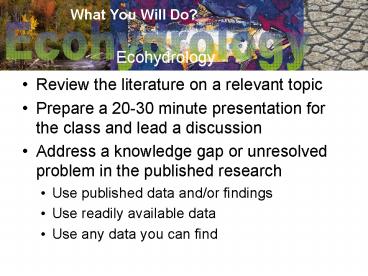Review the literature on a relevant topic - PowerPoint PPT Presentation
1 / 21
Title:
Review the literature on a relevant topic
Description:
Prepare a 20-30 minute presentation for the class and lead a discussion ... If possible, create an Endnote library. Develop a Powerpoint presentation ... – PowerPoint PPT presentation
Number of Views:80
Avg rating:3.0/5.0
Title: Review the literature on a relevant topic
1
What You Will Do?
- Review the literature on a relevant topic
- Prepare a 20-30 minute presentation for the class
and lead a discussion - Address a knowledge gap or unresolved problem in
the published research - Use published data and/or findings
- Use readily available data
- Use any data you can find
2
Class Time
Ecohydrology
Ecohydrology
- Open with a presentation
- Include background summary
- Identify knowledge gaps and/or unresolved issues
- Occasionally we will have a guest speaker
- Discussion and brainstorming
- Introduce the next classs topic and distribute
relevant reading - We may sometimes decide to continue with the
current topic if ideas are ripe
3
Out of Class
Ecohydrology
Ecohydrology
- Review your topic of choice
- If possible, create an Endnote library
- Develop a Powerpoint presentation
- Review the suggested papers for the upcoming
class - Review the suggested papers for the upcoming
class - Tackle a project-problem I encourage groups on
this.
4
An Example Evapotranspiration
Ecohydrology
Ecohydrology
- Pan evaporation rates have been decreasing for at
least the past 50 years - Why?
- Two primary theories exist
- Brutsaert and Parlange say ET is increasing and
this leads to decreasing pan evaporation - Roderick and Farquar say incoming solar radiation
is decreasing, which leads to reduced PET
5
Some Suggested Papers
- Brutsaert, W. and M. B. Parlange, 1998
Hydrologic cycle explains the evaporation
paradox. Nature, 396, 30. - Roderick, M. L. and G. D. Farquhar, 2002 The
cause of decreased pan evaporation over the past
50 years. Science, 298(5597), 1410-1411. - OTHER PAPERS
- Milly, P. C. D. and K. A. Dunne, 2001 Trends in
evaporation and surface cooling in the
Misssissippi River basin. Geophysical Res. Let.,
28(7), 1219-1222. - Peterson, T. C., V. S. Golubev, and P. Y.
Groisman, 1995 Evaporation losing its strength.
Nature, 377(6551), 687-688.
6
Brutsaert and Parlange (1998), Nature
a1Ep
E (when wet)
Ep
7
Brutsaert and Parlange (1998), Nature
E (when dry)
Eo-DH
a1Ep
EoDH
Ep
8
Brutsaert and Parlange (1998), Nature
a1Ep
?EEo-DH
Ep
9
Brutsaert and Parlange (1998), Nature
a1Ep
?EEo-(Drv)
a2l(Drv)
Ep
10
Roderick and Farquar (2002), Science
a1Ep
Ep
11
Roderick and Farquar (2002), Science
a1Ep
?Epa2Rn
- Increased clouds and atmospheric aerosols
- Decreased daily temperature range
- DRn -315 MJ/yr
Ep
12
What about actual ET?
- Can we conceive a conceptual model that resolves
this issue? - Are there any readily available data that cast
insights?
13
Proposed Model
Annual hydrologic budget
14
Data Analysis
Annual hydrologic budget ET P - Q
15
Data Analysis
Data Sources Annual Precipitation U.S. Climate
Division data N. B. Guttman and R. G. Quayle,
Bulletin of the American Meteorological Society
77, 293 (1996) (also, the Northeast Regional
Climate Center - NRCC or National Climate Data
Center - NCDC) Annual Streamflow U.S.
Geological Survey http//waterdata.usgs.gov/nwis/s
w
16
Data Analysis
Annual Precipitation (mm/yr)
17
Data Analysis
Annual Precipitation (mm)
Annual Stream Discharge (mm)
18
Data Analysis
slope 1.05 mm yr-1
Annual Precipitation - Discharge (mm)
19
Model and Published Literature
Annual hydrologic budget
20
Whats Missing?
- Need to resolve the flow parameter, a
- Attempt a sexier analytical solution to the
equation - Changes in extent of vegetation cover and
vegetation type - What about non-steady state?
- Compare model to data
21
Model and Published Literature
Annual hydrologic budget
1950 PET 2.87 m/yr 2000 PET 4.29 m/yr































